高考总复习之情态动词的用法总结课件[下学期]
文档属性
| 名称 | 高考总复习之情态动词的用法总结课件[下学期] |

|
|
| 格式 | rar | ||
| 文件大小 | 2.7MB | ||
| 资源类型 | 教案 | ||
| 版本资源 | 通用版 | ||
| 科目 | 英语 | ||
| 更新时间 | 2006-08-27 00:00:00 | ||
图片预览

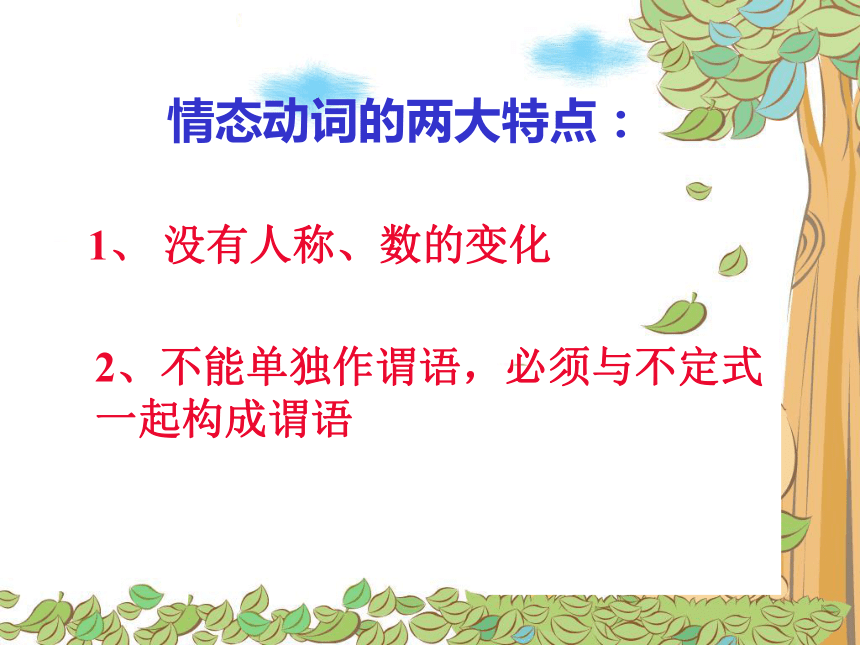

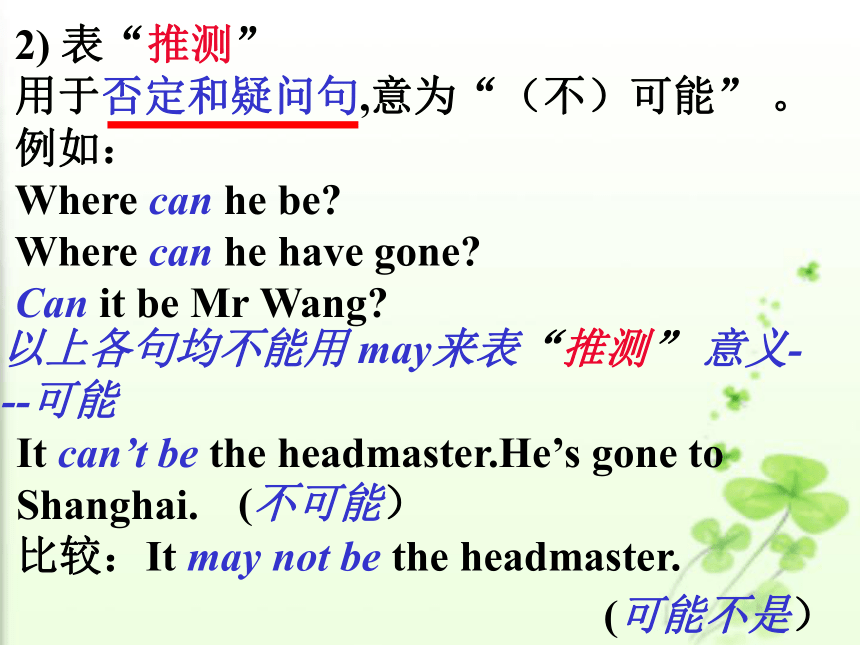
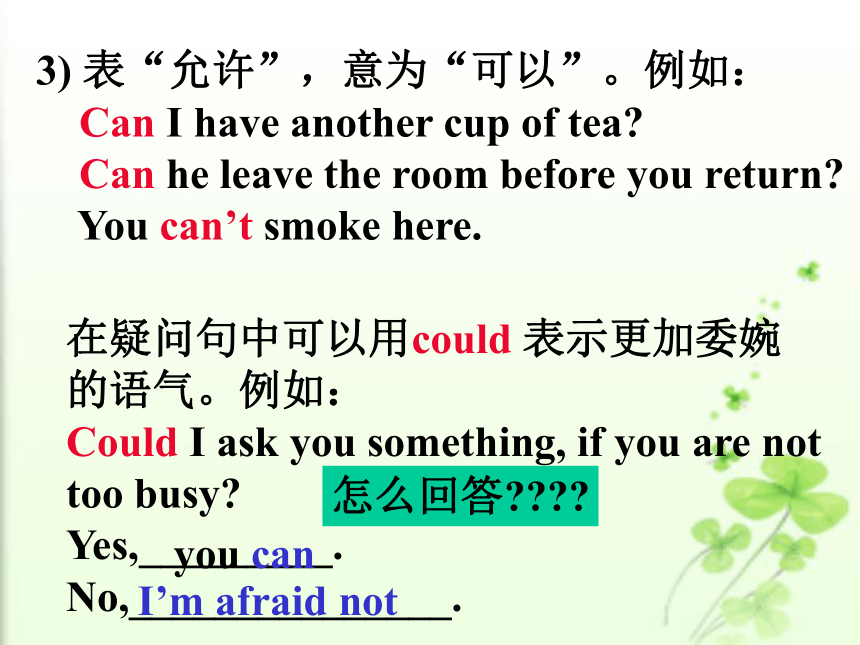
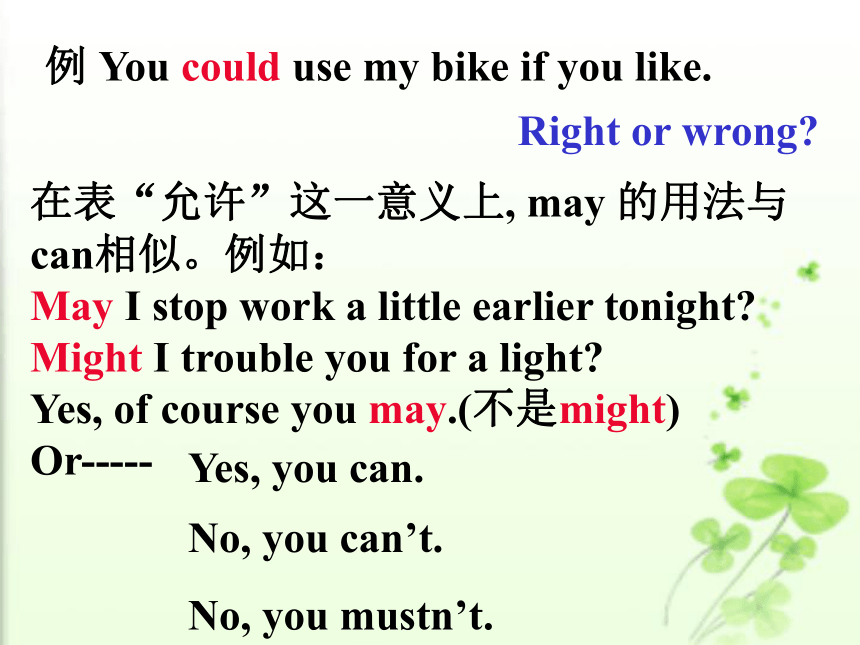
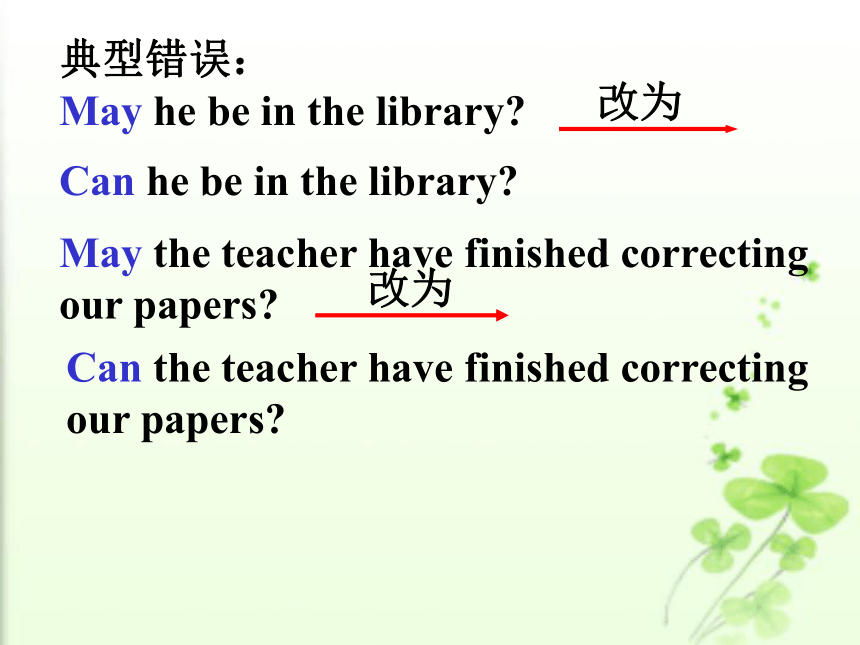
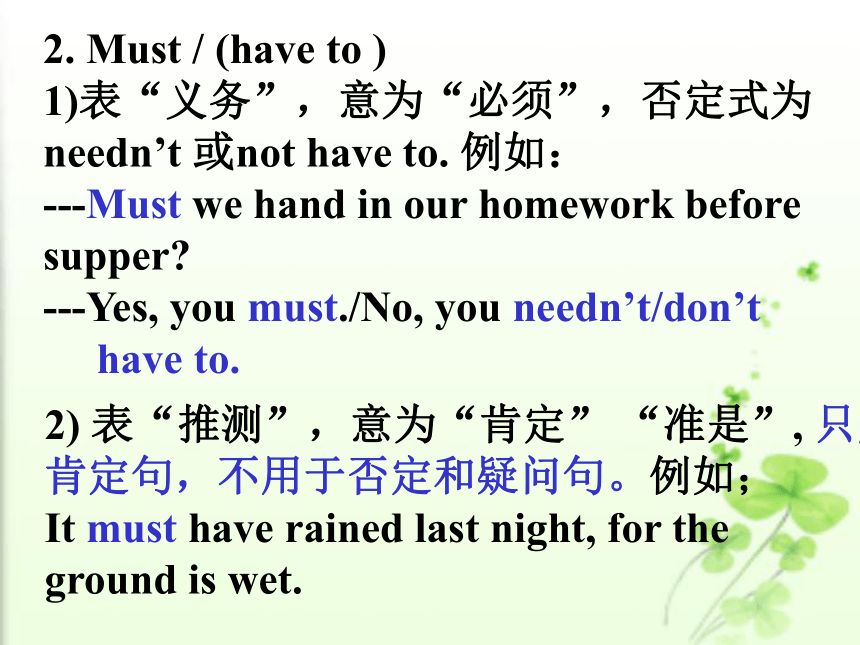
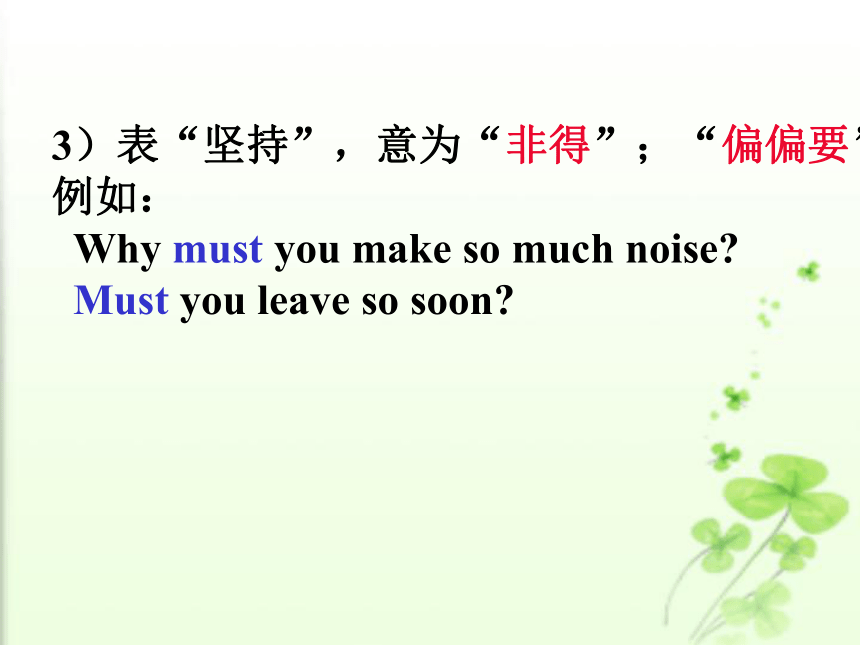
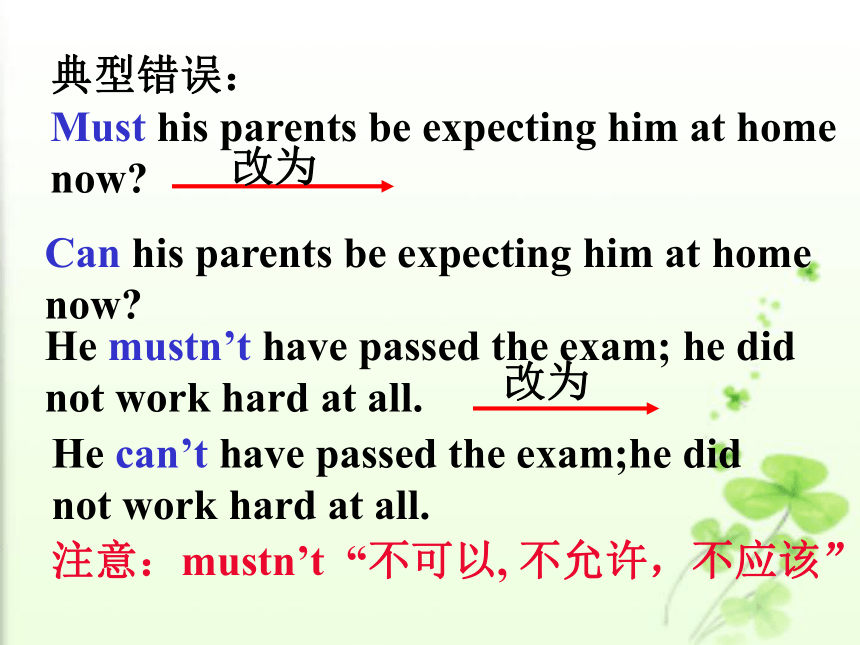
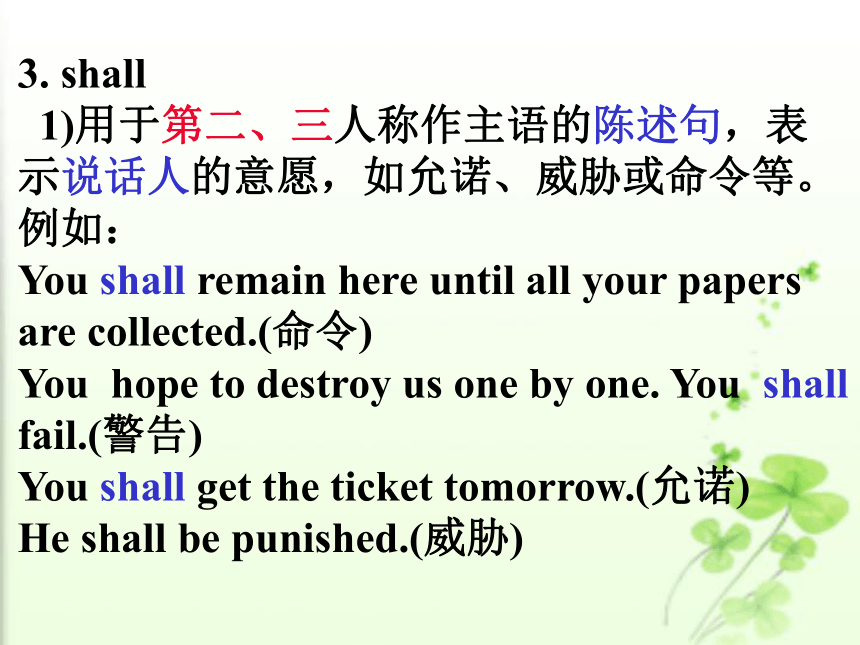
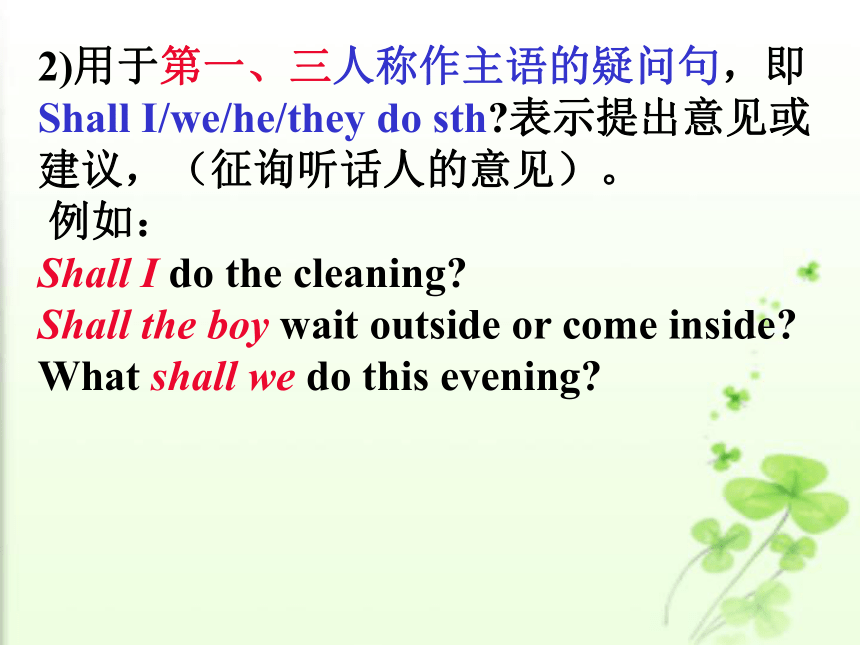
文档简介
课件52张PPT。情态动词用法总结情态动词的两大特点:1、 没有人称、数的变化2、不能单独作谓语,必须与不定式
一起构成谓语can
1)表“能力”
He could speak four foreign languages when he was young, but now he can speak only one.如果表示过去经一番努力做成了某事,
须用was/were able to 而不用could.例如:
There was a big fire in the house, but he was able to escape.
With the help of old paintings and photographs, the people of St. Petersburg were able to bring back the beauty of their culture and history.2) 表“推测”
用于否定和疑问句,意为“(不)可能” 。
例如:
Where can he be?
Where can he have gone?
Can it be Mr Wang?以上各句均不能用 may来表“推测” 意义---可能It can’t be the headmaster.He’s gone to
Shanghai.
比较:It may not be the headmaster.(不可能)(可能不是)3) 表“允许”,意为“可以”。例如:
Can I have another cup of tea?
Can he leave the room before you return?
You can’t smoke here.在疑问句中可以用could 表示更加委婉
的语气。例如:
Could I ask you something, if you are not
too busy?
Yes,_________.
No,_______________.怎么回答????you canI’m afraid not例 You could use my bike if you like.在表“允许”这一意义上, may 的用法与can相似。例如:
May I stop work a little earlier tonight?
Might I trouble you for a light?
Yes, of course you may.(不是might)
Or-----Right or wrong?Yes, you can.No, you can’t.
No, you mustn’t.典型错误:
May he be in the library?Can he be in the library?May the teacher have finished correcting
our papers?改为改为Can the teacher have finished correcting
our papers?2. Must / (have to )
1)表“义务”,意为“必须”,否定式为
needn’t 或not have to. 例如:
---Must we hand in our homework before
supper?
---Yes, you must./No, you needn’t/don’t
have to.2) 表“推测”,意为“肯定” “准是”, 只用于
肯定句,不用于否定和疑问句。例如;
It must have rained last night, for the
ground is wet.3)表“坚持”,意为“非得”;“偏偏要”。
例如:
Why must you make so much noise?
Must you leave so soon?典型错误:
Must his parents be expecting him at home
now?改为Can his parents be expecting him at home
now?He mustn’t have passed the exam; he did
not work hard at all.改为He can’t have passed the exam;he did
not work hard at all.注意:mustn’t “不可以, 不允许,不应该”3. shall
1)用于第二、三人称作主语的陈述句,表示说话人的意愿,如允诺、威胁或命令等。例如:
You shall remain here until all your papers
are collected.(命令)
You hope to destroy us one by one. You shall fail.(警告)
You shall get the ticket tomorrow.(允诺)
He shall be punished.(威胁)2)用于第一、三人称作主语的疑问句,即 Shall I/we/he/they do sth?表示提出意见或建议,(征询听话人的意见)。
例如:
Shall I do the cleaning?
Shall the boy wait outside or come inside?
What shall we do this evening?4. will
1)用于各种人称,表示愿望。意为“愿意”。例如:
A man who won’t work can never expect to succeed.这一含义可以用于if 条件句。例如:
The professor is having a meeting. If you will wait, you can see him.2) 用于各种人称,表示倾向,习惯。意为
“(总是)会”,“老是”。例如:
The boy will sit for hours without moving
a bit. would 表示过去的倾向或习惯,与used to do 相似。例如:
When he lived in the country, he would get up early and take a long walk in the woods.3)表示请求或询问,用于第二人称疑问句,would的语气比will委婉
Will you lend me your pen?
Would you please pass me the ruler? 5. need
表“义务”,意为“需要”。用作情态动词时,只能用于否定和疑问句。肯定句中须用作实义动词。
典型错误:
One need take care of oneself.One needs to take care of oneself.Such a small boy needn’t a ticket.Such a small boy doesn’t need a ticket.改为改为 ---1)Need he hand in his homework now?=
---2)Does he need to hand in his homework
now?
---1)No, he needn’t.
---2)No, he doesn’t. 6. dare
表“勇气”,意为“敢”。用作情态动词时,
只能用于否定句,疑问句和条件句。肯定句中须用作实义动词。例如:
---Dare you go near the dog?
---No, I dare not/daren’t.
If you dare speak to me like that,you will be sorry.典型错误:
The girl dare go out alone at night.
改为The girl dares to go out alone at night.另: I dare say 习语,“可能,或许”
You’re tired, I dare say.Dare she say what she thinks? =
Does she dare to say what she think?
dare有过去式形式,即dared.例如:
Dared he come last night?
No, he dared not(come).7.had better=had best +动词原形 “最好”
否定结构为:had better(best)not
You had better stay at home.
You’d better not wake me up.8.would rather +动词原形 “宁愿”
否定结构为 would rather not
I would rather stay at home.
I would rather not tell you that news.9. Should/ought to表示“应该, 应当”; 表示推测或可能,“按理说应该”
Students should follow teachers’ advice.
Mary should be here by now.
2) 表示说话人的某种情感,如惊奇,愤怒,遗憾,意外等.
The gentleman should be so rude.Ought to 语气强,表责任,义务等
Oughtn’t we give him a chance to have another try?
有时表示非常有可能.
She ought to be home by now.
If we start right now, we ought to be able to get there in time.情态动词+have done/been
表示过去或已经发生的事情(有时带过去时间状语)1. must have done/been---肯定做过
He must have told you something about it
yesterday.2. should /ought to have done ---本应该
You should have come earlier.3. needn’t have done---本来不必
You needn’t have hurried yesterday. You
had quite enough time. could have done/been---本来可以做
He could have passed the exam,but he was
ill at that time.4. can/could have done/been---否定或疑问句中, (不)可能做过
*He can’t/couldn’t have had a good time
at the party, for I saw he was silent all the
time.5. may/might have done/been---可能做过
Tom may/might have read the letter.Have
remembered?Selected from情态动词100题练习
1 . — You ought to have called her
yesterday .
— Yes , I know I ____ .
A . ought to B . ought to have
C . ought have done D . ought to have called
2 . Why did you keep it a secret from me ? I
____about it .
A . should be told
B . ought to have been told
C . should have told
D . ought to be told3 . The girl was frightened by the thief ,
and she stood there without ____ speak .
A . daring to B . daring
C . dare to D . dared to
4 . ____ the bike Smith had stolen ?
A . Been B . Did C . Was D . Had
5 . He looks very tired . He ____ to bed too
late last night .
A . must go B . must have gone
C . could go D . didn't go
6. If you ___ me, I’ll give you some advice.
A. listened to B. will hear
C. will listen to D. will listen to7. A lion ___ only attack a human being
when it is hungry.
A. should B. can C. will D. shall8. Mary looks pale. Did you tell her about
the accident?---Yes, but I ___ her.
A. should have told B. should not tell
C. would rather not have told
D. would rather not tell
9. ---Would you open the window,please?
---Yes, I ____ .
A. will B. would C. do D. can11. He studied hard and ___ pass the
examination.
A. could be able to B. could
C. was able to D. ought to13. I saw him leave the office an hour ago.
He ____ at this time.
A. mustn’t be working
B. can’t be working
C. can’t work
D. may not be working15. Why ____ you keep on troubling me
with such questions while I’m busy?
A. could B. can C. must D. will19. You are running a fever. You ___to see
the doctor.
A. need go B. must have gone
C. should go D. can go20. I ____ take the job. No one___ stop me.
A. will; shall B. will; may
C. should; will D. shall; may21. The door ___ lock.
A. can’t B. may not
C. won’t D. mustn’t22. In three months he ___speak good
English.
A. can B. can be able to
C. will be able to D. may be23. ---I sent him the dictionary by mail
this morning.
---You ____ that ;he’s coming tomorrow
A. needn’t have done B. didn’t have to do
C. needn’t do D. mustn’t do
27. It’s nearly seven o’clock. Jack ___ be
here at any moment.
A. must B. need C. should D. can30. I’m surprised that he ___ to help me
when I needed his help.
A. should refuse
B. would have refused
C. should have refused
D. may have refused42. This car looks like mine, yet it isn’t.
Whose ___ it be?
A. can B. could C. may D. must48. “When ___ he leave the hospital?” I
asked the doctor.
A. will B. shall C. can D. may46. I can’t think he ___ tell me a lie.
A. might B. could C. would D. should59. I didn’t hear the phone. I ___asleep.
A. must B. must have been
C. should be D. should have been67. ---What has happened to Tom?
--- I don’t know. He ___ lost.
A. could get B. might get
C. can have got D. may have got 68. He ___ you more help even though
he was very busy.
A. might have given B. might give
C. may have given D. may give69. ---I stayed at a hotel while in New York.
---Oh, did you? You ___ with Barbara.
A. could have stayed B. could stay
C. would stay D. must have stayed85. ---There were already five people in
the car but they managed to take me
as well.
---It ___ a comfortable journey.
A. can’t be B. shouldn’t be
C. mustn’t have been
D. couldn’t have been99. Naturally, after I told her what to do.
my daughter ___ go and do the opposite.
A. may B. can C. must D. shouldCorrect the following sentences
---I wonder why he is late.---He can have
missed the early bus.may2. Look what you’ve done! You should be
more careful.have been3. Why can you always interrupt me? must4. I should have been here, but I can’t
find the time.couldn’t5. You mustn’t read that book if you don’t
want to.needn’t6. ---We’ll be ready to leave at six---Well,
Ralph certainly must be back then.should7. Did you use play football at middle
school?use to8. To finish the paper, I need look up
more facts.to9. You had not better touch it. It may be
dangerous.
You had better not touch it……10. Tom ought not to tell me your secret,
but he meant no harm.Tom ought not to have told me your
secret, ……Compare:
I didn’t need to get up early yesterday,
because it was Sunday.
表示过去的一个事实-“没有必要做”但是,表示理论上的可能性,can 可以用于肯定句。例如:
Accidents can happen.
It can be a very difficult thing for foreigners to learn Chinese.could 可以用于肯定句表示可能性,可以
指对现在事情的更不确定的推测。例如:
What he said could/may be right.
We can use coal to produce electricity for agriculture and industry.
Good morning, can I help you?
The road can be blocked up.shall 用法讲解Shall ----v.aux.
(过去时should)(shall 可缩写为 'll , shall not 常缩写为 shan't, 美国人常用will代替)
1.[用于主语为第一人称单复数, 表示单纯将来] 将要, 会
I shall be forty on my next birthday.
到下次生日, 我就满四十岁。We shall be on holiday at this time next week.
我们将于下星期这个时候度假。
I shall ring you up as soon as I arrive.
我一到就给你打电话。
2.[用于陈述句第二、三人称, 表示说话者的意图、警告、命令、决心等, 主语的行动受讲话者支配] 必须, 应, 可He shall go.
他可以去。
You shall have an answer by tomorrow.
到明天你可以得到答复。
He shall have a bicycle for his birthday.
他可以得到一架自行车作为生日礼物。
She shall not enter my house again.
她不得再进我家。3.[在问句中, 征 询对方对于主语行动的意见(提供帮助, 提出建议、要求给予指示和征求意见), 主要用于第一、三人称]... 好吗? 要不要...?
Shall I carry your bag ?
我帮你拿手提包, 好吗?
Shall he come to see you ?
要不要他来看你?
4.[用于第三人称, 在条约、规定、法令等文件中表示义务或规定]应, 必须
No reader shall remove a book from the library without consent of the librarian.
非经管理员同意, 读者不准把书带出图书馆。
The National Party Congress shall be convened every five years .
党的全国代表大会每五年举行一次。5.[在表示意图、要求等的从句中] 应该, 要
I wish that you shall stay at home tonight .
我希望今晚你留在家里。
You say you will not do it, but I say you shall do it.
你说你不做这事, 但是我说, 你非做不可。
6.[用于将来时态的间接引语, 与直接引语中的shall相应]将
He says that he shall [will] be glad to see you. (=He says, “I shall be glad to see you.”)
他说他将乐意来看你。退出The end
一起构成谓语can
1)表“能力”
He could speak four foreign languages when he was young, but now he can speak only one.如果表示过去经一番努力做成了某事,
须用was/were able to 而不用could.例如:
There was a big fire in the house, but he was able to escape.
With the help of old paintings and photographs, the people of St. Petersburg were able to bring back the beauty of their culture and history.2) 表“推测”
用于否定和疑问句,意为“(不)可能” 。
例如:
Where can he be?
Where can he have gone?
Can it be Mr Wang?以上各句均不能用 may来表“推测” 意义---可能It can’t be the headmaster.He’s gone to
Shanghai.
比较:It may not be the headmaster.(不可能)(可能不是)3) 表“允许”,意为“可以”。例如:
Can I have another cup of tea?
Can he leave the room before you return?
You can’t smoke here.在疑问句中可以用could 表示更加委婉
的语气。例如:
Could I ask you something, if you are not
too busy?
Yes,_________.
No,_______________.怎么回答????you canI’m afraid not例 You could use my bike if you like.在表“允许”这一意义上, may 的用法与can相似。例如:
May I stop work a little earlier tonight?
Might I trouble you for a light?
Yes, of course you may.(不是might)
Or-----Right or wrong?Yes, you can.No, you can’t.
No, you mustn’t.典型错误:
May he be in the library?Can he be in the library?May the teacher have finished correcting
our papers?改为改为Can the teacher have finished correcting
our papers?2. Must / (have to )
1)表“义务”,意为“必须”,否定式为
needn’t 或not have to. 例如:
---Must we hand in our homework before
supper?
---Yes, you must./No, you needn’t/don’t
have to.2) 表“推测”,意为“肯定” “准是”, 只用于
肯定句,不用于否定和疑问句。例如;
It must have rained last night, for the
ground is wet.3)表“坚持”,意为“非得”;“偏偏要”。
例如:
Why must you make so much noise?
Must you leave so soon?典型错误:
Must his parents be expecting him at home
now?改为Can his parents be expecting him at home
now?He mustn’t have passed the exam; he did
not work hard at all.改为He can’t have passed the exam;he did
not work hard at all.注意:mustn’t “不可以, 不允许,不应该”3. shall
1)用于第二、三人称作主语的陈述句,表示说话人的意愿,如允诺、威胁或命令等。例如:
You shall remain here until all your papers
are collected.(命令)
You hope to destroy us one by one. You shall fail.(警告)
You shall get the ticket tomorrow.(允诺)
He shall be punished.(威胁)2)用于第一、三人称作主语的疑问句,即 Shall I/we/he/they do sth?表示提出意见或建议,(征询听话人的意见)。
例如:
Shall I do the cleaning?
Shall the boy wait outside or come inside?
What shall we do this evening?4. will
1)用于各种人称,表示愿望。意为“愿意”。例如:
A man who won’t work can never expect to succeed.这一含义可以用于if 条件句。例如:
The professor is having a meeting. If you will wait, you can see him.2) 用于各种人称,表示倾向,习惯。意为
“(总是)会”,“老是”。例如:
The boy will sit for hours without moving
a bit. would 表示过去的倾向或习惯,与used to do 相似。例如:
When he lived in the country, he would get up early and take a long walk in the woods.3)表示请求或询问,用于第二人称疑问句,would的语气比will委婉
Will you lend me your pen?
Would you please pass me the ruler? 5. need
表“义务”,意为“需要”。用作情态动词时,只能用于否定和疑问句。肯定句中须用作实义动词。
典型错误:
One need take care of oneself.One needs to take care of oneself.Such a small boy needn’t a ticket.Such a small boy doesn’t need a ticket.改为改为 ---1)Need he hand in his homework now?=
---2)Does he need to hand in his homework
now?
---1)No, he needn’t.
---2)No, he doesn’t. 6. dare
表“勇气”,意为“敢”。用作情态动词时,
只能用于否定句,疑问句和条件句。肯定句中须用作实义动词。例如:
---Dare you go near the dog?
---No, I dare not/daren’t.
If you dare speak to me like that,you will be sorry.典型错误:
The girl dare go out alone at night.
改为The girl dares to go out alone at night.另: I dare say 习语,“可能,或许”
You’re tired, I dare say.Dare she say what she thinks? =
Does she dare to say what she think?
dare有过去式形式,即dared.例如:
Dared he come last night?
No, he dared not(come).7.had better=had best +动词原形 “最好”
否定结构为:had better(best)not
You had better stay at home.
You’d better not wake me up.8.would rather +动词原形 “宁愿”
否定结构为 would rather not
I would rather stay at home.
I would rather not tell you that news.9. Should/ought to表示“应该, 应当”; 表示推测或可能,“按理说应该”
Students should follow teachers’ advice.
Mary should be here by now.
2) 表示说话人的某种情感,如惊奇,愤怒,遗憾,意外等.
The gentleman should be so rude.Ought to 语气强,表责任,义务等
Oughtn’t we give him a chance to have another try?
有时表示非常有可能.
She ought to be home by now.
If we start right now, we ought to be able to get there in time.情态动词+have done/been
表示过去或已经发生的事情(有时带过去时间状语)1. must have done/been---肯定做过
He must have told you something about it
yesterday.2. should /ought to have done ---本应该
You should have come earlier.3. needn’t have done---本来不必
You needn’t have hurried yesterday. You
had quite enough time. could have done/been---本来可以做
He could have passed the exam,but he was
ill at that time.4. can/could have done/been---否定或疑问句中, (不)可能做过
*He can’t/couldn’t have had a good time
at the party, for I saw he was silent all the
time.5. may/might have done/been---可能做过
Tom may/might have read the letter.Have
remembered?Selected from情态动词100题练习
1 . — You ought to have called her
yesterday .
— Yes , I know I ____ .
A . ought to B . ought to have
C . ought have done D . ought to have called
2 . Why did you keep it a secret from me ? I
____about it .
A . should be told
B . ought to have been told
C . should have told
D . ought to be told3 . The girl was frightened by the thief ,
and she stood there without ____ speak .
A . daring to B . daring
C . dare to D . dared to
4 . ____ the bike Smith had stolen ?
A . Been B . Did C . Was D . Had
5 . He looks very tired . He ____ to bed too
late last night .
A . must go B . must have gone
C . could go D . didn't go
6. If you ___ me, I’ll give you some advice.
A. listened to B. will hear
C. will listen to D. will listen to7. A lion ___ only attack a human being
when it is hungry.
A. should B. can C. will D. shall8. Mary looks pale. Did you tell her about
the accident?---Yes, but I ___ her.
A. should have told B. should not tell
C. would rather not have told
D. would rather not tell
9. ---Would you open the window,please?
---Yes, I ____ .
A. will B. would C. do D. can11. He studied hard and ___ pass the
examination.
A. could be able to B. could
C. was able to D. ought to13. I saw him leave the office an hour ago.
He ____ at this time.
A. mustn’t be working
B. can’t be working
C. can’t work
D. may not be working15. Why ____ you keep on troubling me
with such questions while I’m busy?
A. could B. can C. must D. will19. You are running a fever. You ___to see
the doctor.
A. need go B. must have gone
C. should go D. can go20. I ____ take the job. No one___ stop me.
A. will; shall B. will; may
C. should; will D. shall; may21. The door ___ lock.
A. can’t B. may not
C. won’t D. mustn’t22. In three months he ___speak good
English.
A. can B. can be able to
C. will be able to D. may be23. ---I sent him the dictionary by mail
this morning.
---You ____ that ;he’s coming tomorrow
A. needn’t have done B. didn’t have to do
C. needn’t do D. mustn’t do
27. It’s nearly seven o’clock. Jack ___ be
here at any moment.
A. must B. need C. should D. can30. I’m surprised that he ___ to help me
when I needed his help.
A. should refuse
B. would have refused
C. should have refused
D. may have refused42. This car looks like mine, yet it isn’t.
Whose ___ it be?
A. can B. could C. may D. must48. “When ___ he leave the hospital?” I
asked the doctor.
A. will B. shall C. can D. may46. I can’t think he ___ tell me a lie.
A. might B. could C. would D. should59. I didn’t hear the phone. I ___asleep.
A. must B. must have been
C. should be D. should have been67. ---What has happened to Tom?
--- I don’t know. He ___ lost.
A. could get B. might get
C. can have got D. may have got 68. He ___ you more help even though
he was very busy.
A. might have given B. might give
C. may have given D. may give69. ---I stayed at a hotel while in New York.
---Oh, did you? You ___ with Barbara.
A. could have stayed B. could stay
C. would stay D. must have stayed85. ---There were already five people in
the car but they managed to take me
as well.
---It ___ a comfortable journey.
A. can’t be B. shouldn’t be
C. mustn’t have been
D. couldn’t have been99. Naturally, after I told her what to do.
my daughter ___ go and do the opposite.
A. may B. can C. must D. shouldCorrect the following sentences
---I wonder why he is late.---He can have
missed the early bus.may2. Look what you’ve done! You should be
more careful.have been3. Why can you always interrupt me? must4. I should have been here, but I can’t
find the time.couldn’t5. You mustn’t read that book if you don’t
want to.needn’t6. ---We’ll be ready to leave at six---Well,
Ralph certainly must be back then.should7. Did you use play football at middle
school?use to8. To finish the paper, I need look up
more facts.to9. You had not better touch it. It may be
dangerous.
You had better not touch it……10. Tom ought not to tell me your secret,
but he meant no harm.Tom ought not to have told me your
secret, ……Compare:
I didn’t need to get up early yesterday,
because it was Sunday.
表示过去的一个事实-“没有必要做”但是,表示理论上的可能性,can 可以用于肯定句。例如:
Accidents can happen.
It can be a very difficult thing for foreigners to learn Chinese.could 可以用于肯定句表示可能性,可以
指对现在事情的更不确定的推测。例如:
What he said could/may be right.
We can use coal to produce electricity for agriculture and industry.
Good morning, can I help you?
The road can be blocked up.shall 用法讲解Shall ----v.aux.
(过去时should)(shall 可缩写为 'll , shall not 常缩写为 shan't, 美国人常用will代替)
1.[用于主语为第一人称单复数, 表示单纯将来] 将要, 会
I shall be forty on my next birthday.
到下次生日, 我就满四十岁。We shall be on holiday at this time next week.
我们将于下星期这个时候度假。
I shall ring you up as soon as I arrive.
我一到就给你打电话。
2.[用于陈述句第二、三人称, 表示说话者的意图、警告、命令、决心等, 主语的行动受讲话者支配] 必须, 应, 可He shall go.
他可以去。
You shall have an answer by tomorrow.
到明天你可以得到答复。
He shall have a bicycle for his birthday.
他可以得到一架自行车作为生日礼物。
She shall not enter my house again.
她不得再进我家。3.[在问句中, 征 询对方对于主语行动的意见(提供帮助, 提出建议、要求给予指示和征求意见), 主要用于第一、三人称]... 好吗? 要不要...?
Shall I carry your bag ?
我帮你拿手提包, 好吗?
Shall he come to see you ?
要不要他来看你?
4.[用于第三人称, 在条约、规定、法令等文件中表示义务或规定]应, 必须
No reader shall remove a book from the library without consent of the librarian.
非经管理员同意, 读者不准把书带出图书馆。
The National Party Congress shall be convened every five years .
党的全国代表大会每五年举行一次。5.[在表示意图、要求等的从句中] 应该, 要
I wish that you shall stay at home tonight .
我希望今晚你留在家里。
You say you will not do it, but I say you shall do it.
你说你不做这事, 但是我说, 你非做不可。
6.[用于将来时态的间接引语, 与直接引语中的shall相应]将
He says that he shall [will] be glad to see you. (=He says, “I shall be glad to see you.”)
他说他将乐意来看你。退出The end
